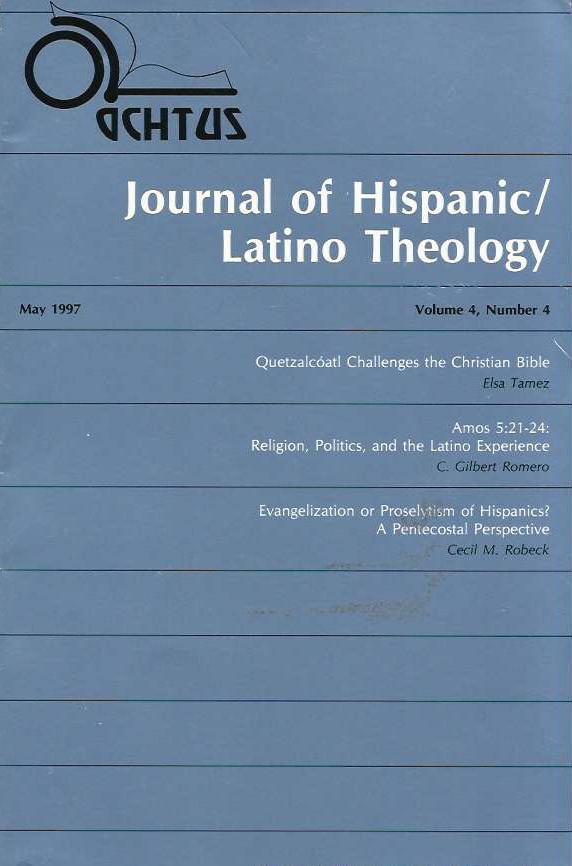Volume 4, Number 4 (1997)
Biblical Crossings of Borders and Cultures
The Bible, as a point of contact and as a crossroads of controversy, figures prominently in this issue, with prophetic voices past and present addressing urgent appeals for serious critical reflection and for active engagement in the liberating work of justice. Contributions by a Methodist, a Roman Catholic priest, and an Assemblies of God minister attest to the ecumenical importance of this concern throughout the Americas. All three converge in the shared conviction that authentic and unambiguous fidelity to the truth of the Gospel must combine honest speaking with genuine attention to the voices of the other.The opening article, “Quetzalcoatl Challenges the Christian Bible,” is by Dr. Elsa Tamez (Ph.D., University of Lausanne, Switzerland), a Methodist who is professor at the Seminario Bíblico Latinoamericano in San José, Costa Rica. Dr. Tamez is the author of Bible of the Oppressed (Maryknoll, N.Y.: Orbis Books, 1982)

In “Amos 5:21-24: Religion, Politics, and the Latino Experience,” Dr. C. Gilbert Romero, a Roman Catholic priest of the Archdiocese of Los Angeles who holds a PhD. from Princeton Theological Seminary, pursues further the insights he developed in his book Hispanic Devotional Piety: Tracing the Biblical Roots (Maryknoll, N.Y.: Orbis Books, 1991). He suggests insights into ways in which connections between religion and politics, between acts of worship and deeds of justice, set forth in the book of the eighth-century B.C.E. prophet Amos, might nourish an understanding of the links between religion and politics in the experience of Latinas and Latinos.

In an essay originally delivered before the US. National Association of Diocesan Ecumenical Directors, Dr. Cecil M. Robeck Jr. presents “Evangelization or Proselytism of Hispanics: A Pentecostal Perspective.” Dr. Robeck, an Assemblies of God minister who is professor of Church History at Fuller Theological Seminary, Pasadena, California, co-chairs the international Roman Catholic-Pentecostal dialogue. In the light of the history of U.S. Hispanic involvement in the Pentecostal movement, he underlines the need for sustained dialogue in arriving at common understandings and in working toward the sort of genuine koinōnia that promotes authentic witness to the Gospel.
— Jean-Pierre Ruiz
St. John's University
Jamaica, N.Y.
Editorial
From the Editor
Jean-Pierre Ruiz
Articles
Amos 5:21-24: Religion, Politics, and the Latino Experience
C. Gilbero Romero
Evangelization or Proselytism of Hispanics? A Pentecostal Perspective
Cecil M. Robeck Jr.
Book Reviews
Donoso Cortés: Cassandra of the Age
R.A. Herrera
The Latino Encyclopedia
Richard Chabrán and Rafael Chabrán
Mestizo Christianity: Theology from the Latino Perspective
Arturo J. Bañuelas ed.
The Postmodern Bible: The Bible and Culture Collective
George Aichele ed.
Systematic Theology: Perspectives from Liberation Theology
Jon Sobrino and Ignacio Ellacuría

Editors (vol. 4 no. 4)
- Editor
- Jean-Pierre Ruiz
- St. John's University, New York
- Associate Editor
- Alejandro García-Rivera
- Jesuit School of Theology at Berkeley

